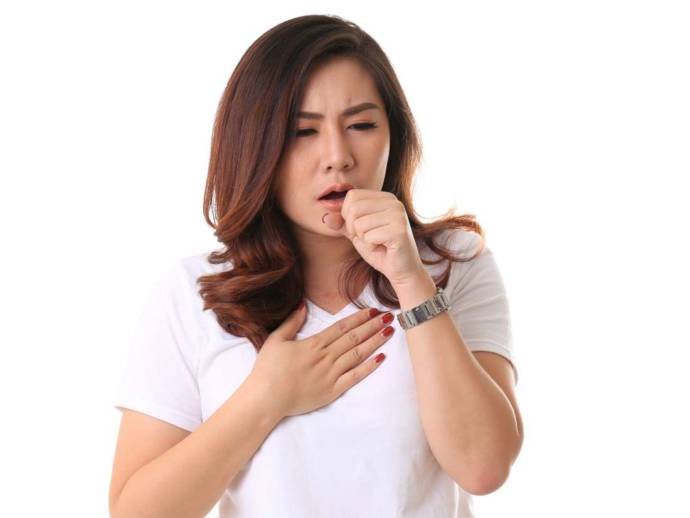A cough is a type of protective reflex which helps in emitting any irritants, microbes, foreign particles, mucus and fluids that blocks the respiratory tract. A cough is caused due to infection, allergy, pollution, smoking, and inhalation of irritant gases. Diagnosis of a cough can be done through physical valuation, chest X-ray and lung function test.
Types
A cough is just the reflection of any disorder present in the body. This means that a cough, as such, is not a disease, rather it is the symptoms of the disease. Further, it is the reflex action of the body to remove the irritant from the body. The classification of a cough depends upon the variety of factors including time, frequency, duration, effects or characteristics. Following are the different types of a cough:
- Wet cough: Wet cough is characterized by the presence of mucus secretion in the respiratory tract. Coughing helps the removal of mucus from the respiratory tract and is often caused due to asthma and infection.
- Dry cough: In this type of cough, there is no mucus secretion. It is generally caused due to inflammation in the throat due to viral likeness or allergy. Coughing irritates the throat which further causes more coughing.
- Croup cough: Caused due to viral infection, croup cough results in the swelling just below the vocal cords. This causes a harsh, barking sound while coughing.
- Whooping cough: Also known as Pertussis, whooping cough is caused by infection. It is characterized by the presence of continuous coughing, especially at night. After a continuous cough, the patient breathes deeply making a whooping sound.
Causes
- Infection: Infection is the most common cause of a cough. Infection may be due to a virus and bacteria. The infection caused may be acute such as common cold or chronic such as pneumonia.
- Allergy: Mucus is secreted in the respiratory tract in response to allergens such as dust, pollution, and pollens. A cough develops to remove the mucus from the air pipe and ease breathing.
- Smoking: Cough also develops in the people who smoke. Initially the cough is non-productive but later on, it becomes productive contains phlegm.
- Postnasal drip: Whenever the thicker mucus formed in the nose slides down into the throat, it momentarily chokes the airway causing cough reflex.
- Medications: Various medications such as ACE inhibitors commonly cause a cough as side effects.
- Asthma: Asthma is the condition characterized by the presence of inflammation in the airways. Asthma is one of the leading causes of a chronic cough.
- GERD: A chronic cough can be caused by gastroesophageal reflux disease.
- Chronic bronchitis: Bronchitis is the condition wherein there is an inflammation in the bronchioles. A cough is one of the symptoms of chronic bronchitis.
- Pulmonary embolism: Pulmonary embolism is a clot inside the pulmonary artery. This causes shortness of breath, cough and chest pain.
- Inhalational injury: Inhaling substances that irritate the respiratory tract leads to mucus secretion and causes a cough. These substances include irritant chemicals, smoke, and toxic gases.
Symptoms
- A runny nose
- Post-nasal drip
- Wheezing
- Difficulty breathing
- Easy fatigue while exercising
- A sore throat
- Difficulty swallowing
- Hoarse voice
Ways to diagnose
- Physical evaluation: Physician may diagnose a cough by physically examining the condition of the patient. Chest examination can be done with the help of a stethoscope.
- Chest X-ray: Chest X-ray is done to analyze the condition of the lungs. This will also help to find out the cause of cough such as a cough may be caused due to sinusitis. Other possible conditions for a cough such as pneumonia and lung cancer can also be diagnosed through a chest X-ray.
- Lung function test: Lung function test is used to analyze the functional capacity of the lungs. Spirometry is a common lung function test which helps in diagnosing asthma and chronic obstructive pulmonary disease.
Risks if neglect
Various complications may develop if a cough is neglected.
- Pneumonia: A chronic cough may lead to a severe infective condition such as pneumonia.
- Cough-induced vomiting: Unmanaged coughing may also lead to vomiting and patient discomfort.
- Pneumothorax: A violent cough leads to rupture of blebs and cause spontaneous pneumothorax.
- Insomnia: Due to continuous coughing, the patient may not be able to sleep and may develop insomnia.
Stages
Following are the three phases of a cough:
- Inhalation: In this phase, the air is breath-in into the lungs. This phase is essential for cough as it generates the air necessary for a cough.
- Compression phase: In this phase, the muscles of the chest wall, diaphragm, and abdominal wall contracts leading to high pressure in the thoracic region.
- Expiratory phase: This phase results in the explosive releases of air from the thoracic chamber causing the cough sound. Further, this will also help in dislodging the mucus.
Foods to eat and avoid
Foods to eat:
- Hot soup and tea.
- Honey
- Ginger
- Coconut water
- Citrus fruits
- Blueberries and broccoli
Foods to avoid:
- Snacks and fast food.
- Alcohol
- Caffeine
- Fried food
- Dairy products
Prevention tips
- Drink an adequate amount of fluid.
- Stay away from pollution.
- Do not smoke.
- Don’t ignore initial cold and flu symptoms.
- Sneeze with a handkerchief on your face.
When to see a doctor
Visit your doctor if:
- You feel severe breathing difficulty.
- Your symptoms do not go away even after taking medication.
- You have blood along with mucus.
- You have a cough for more than 2 weeks.
- You feel pain while breathing.
Do’s & Don’ts
Do’s
- Always cough while keeping a napkin or tissue paper on your mouth.
- Eat healthy food to increase immunity and avoid infection.
- Drink plenty of fluid.
- Maintain proper hygiene.
- Take medications as prescribed.
- Take steam inhalation to ease breathing.
Don’ts
- Don’t smoke.
- Don’t do rigorous physical activity when suffering from a cough and cold.
- Avoid areas containing toxic gases or irritant inhalants.
- Don’t eat food items which trigger a cough.
Risks for specific people
People who have a medical history of asthma, bronchiectasis, COPD, and pneumonia are at higher risk of developing a cough. Habitual smokers are also at significant risk of developing a cough.





